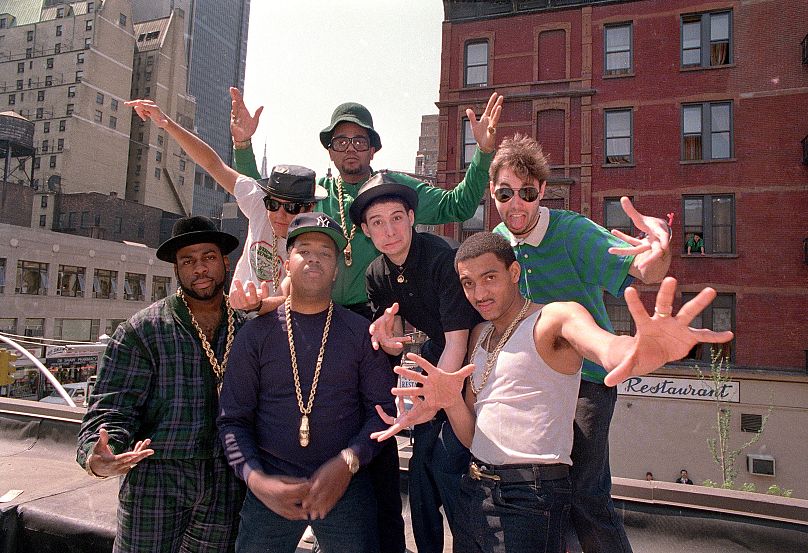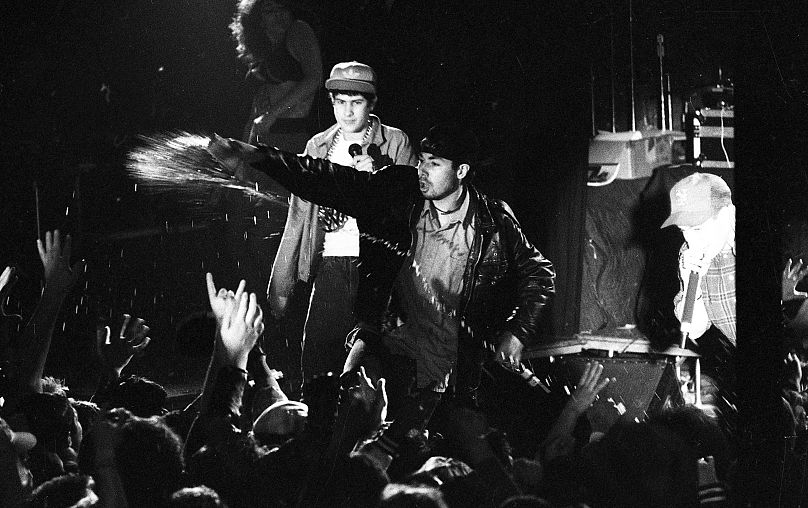15 November 1986: ‘Licensed to Ill’ is released.
This year, the world has celebrated the 50th anniversary of hip-hop.
 ADVERTISEMENT
ADVERTISEMENT
 ADVERTISEMENT
ADVERTISEMENT
The genre was born in 1973 when teenager Clive Campbell (known as Kool Herc) played a block party in the Bronx while switching between two turntables to create the core of hip-hop’s sound.
In the 50 years since, hip-hop has grown to become one of the dominant influences on popular culture. Today, the genre’s aesthetic inspires clothing brands, its stars are international celebrities, and the music regularly tops the charts.
This wasn’t always the case though.
On this day in 1986, the first ever hip-hop album to hit number one in the US charts was released.
The Beastie Boys formed in 1981. New York Jewish teens Michael ‘Mike D’ Diamond, Adam ‘MC’ Yauch, and Adam ‘Ad-Rock’ Horovitz created the group out of their previous band the Young Aborigenes.
Originally a hardcore punk band, the group shifted towards a hip-hop sound when they experimented with sampling and rapping on the comedy single ‘Cooky Puss’.
The track was a success for the boys and they hired Rick Rubin to DJ for their live shows. This was around the time Rubin was starting up Def Jam Records from his New York University dorm room. Early signees to the label, the Beastie Boys released an even more popular record, the single ‘Rock Hard’ in 1984. They supported Public Image Ltd. and Madonna, as well as toured alongside up and coming hip-hop names like DJ Hurricane, Run-DMC and LL Cool J.
In 1986, Beastie Boys set about recording their first full album. The result was ‘Licensed to Ill’.
Released on this day in 1986, it would go on to be a commercial and critical hit. It was the first ever rap album to reach the number one spot on the Billboard 200.
The single ‘(You Gotta) Fight for Your Right (To Party!)’ reached number seven on the Billboard Hot 100 in 1987. In 1987, it became the second ever rap album to be certified platinum after Run-DMC’s ‘Raising Hell’ – also produced by Rubin.
The legacy of ‘Licensed to Ill’ however is a troubling one, and one that the members of the Beastie Boys all contended with in the years since.
There is the famous tale that the band originally wanted to call the album ‘Don’t Be a Faggot’ but the distributor Columbia Records refused the title as it was homophobic.
While the title was changed, what wasn’t are the myriad homophobic and sexist lyrics that make up the songs. In the years since, Horovitz has issued an apology for the frat-boy attitude he had at the time, and Yauch also rapped his regrets on the 1994 track ‘Sure Shot’.
Uncomfortable at the time with their increasingly frat-boy image, the band left Def Jam Records and relocated to LA to record their follow up album.
1989’s ‘Paul’s Boutique’ took the blueprint from their first album and took everything up to 11. The “veritable how-to on extensive and layered sampling” was another hit and compared to their first “has aged like fine wine,” we wrote in our 50th anniversary celebration of hip-hop.
Alongside the changing legacy of the album’s lyrical content, the other elephant in the room has always been the personnel behind such an important album in hip-hop’s history. That one of the first big commercial successes in a Black genre came for a trio of Jewish boys is an awkward note in musical history.
It’s undoubted that some of their commercial success would have been the result of a white band being more palatable to labels, radio stations and white audiences back then. But it’s worth noting that while Beastie Boys were outsiders to the then-underground genre, they have long been embraced for their wholehearted artistic investment.
From the get-go, Beastie Boys clearly understood the genre, its humour and its attitude, and made unique revolutionary albums over the course of their career.












